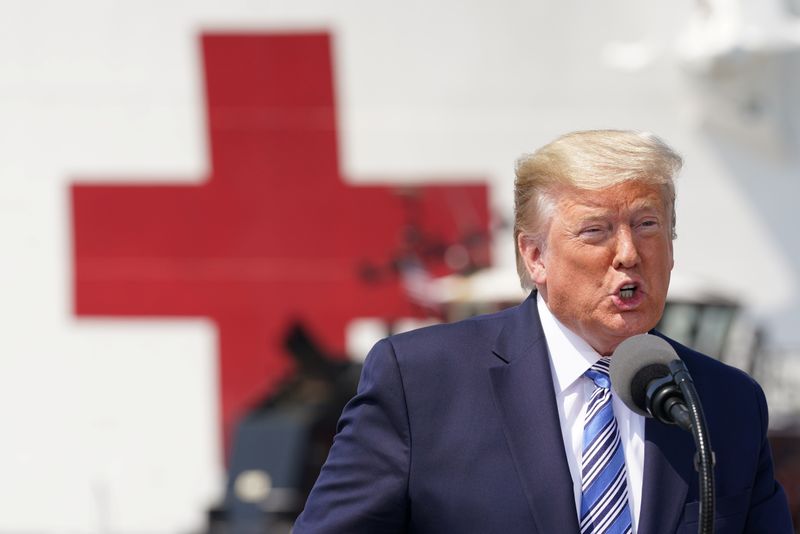By Steve Holland
WASHINGTON (Reuters) - The coronavirus pandemic is forcing President Donald Trump to show empathy to console Americans under siege, and it's not easy for a brash leader more accustomed to bellicose politics.
Trump, who initially dismissed the pandemic as "under control," is having to adjust his messaging to fit grim times, and some of his allies are pushing him to show more heart.
"It's not usually his first go-to emotion," said a former senior administration official who remains close to the White House.
Two sources familiar with the internal dynamics of the White House said advisers twice intervened during the last week to nudge Trump to drop the strident language that is a hallmark of his presidency and instead seek to unite Americans.
It is rare for Trump to back down from a public statement but he softened his tone on both occasions after being urged to.
In the first instance, Trump had a testy exchange with a journalist who asked what he had to say to Americans who were scared by the virus, calling him a "terrible reporter" who had posed a "very nasty question."
After his outburst, advisers urged Trump to "tell people something real, something emotional, something heartfelt," one source said.
The next day, the president tried a softer tone. "This is a time of shared national sacrifice, but it's also a time to treasure our loved ones," he said.
In the second case, Trump dropped - at least for now - his description of the disease as "the Chinese virus" at the urging of aides who argued he did not need to give the news media a fresh opportunity to attack him, the source said.
In response, Trump sought to tamp down anti-Asian sentiment among some Americans, saying in a post on Twitter that "it is very important that we totally protect our Asian American community."
Asked by Fox News Channel anchor Bill Hemmer if he regretted his "Chinese virus" rhetoric, Trump said he did not but added: "Look, everyone knows it came out of China, but I decided we shouldn't make any more of a big deal out of it."
White House spokesman Judd Deere, asked for comment, said "any suggestion that the president is struggling on tone or message is completely false."
"During these difficult times, Americans are receiving comfort, hope and resources from their president," Deere said.
Trump's tendency during his three years as president has been to punch back against his critics, never shying from a fight, and never apologizing.
His early response to the coronavirus, playing down the seriousness of the risk, backfired as it spread across the United States, infecting more than 115,000 people, killing almost 2,000 and forcing much of the economy to be shut down.
Sources inside and outside the White House say Trump will respond when senior advisers urge him to tweak his language. They say sometimes he will reach that conclusion on his own by watching the response on social media to his comments.
The latest Reuters/Ipsos poll showed 49% of Americans approved of Trump's handling of the crisis, compared with 46% who did not. Still, the spread of the virus and resulting economic devastation may jeopardize his re-election bid.
Trump is eager to get the economy going again, at one point suggesting Easter Sunday, April 12, as a potential benchmark, and he has accused his Democratic critics of wanting to keep the economy in paralysis to improve their chances of ousting him in the Nov. 3 election.
"I think there are certain people that would like it to do financially poorly because they think that would be very good as far as defeating me at the polls," Trump said on Wednesday.
Some long-time allies, viewing Trump's daily news conferences, see the New York property developer they know well, one who built a fortune by battling back from bankruptcy and who hawked products as the "best ever" - beef steaks, his own wine label, his golf resorts and hotels, and on and on.
But the view among senior officials and other allies is that if Trump is to win re-election, he needs to show an accomplished handling of the government's response to the virus.

"You rise or fall based on what you do within this building," said a senior White House official. "That is absolutely true of President Trump and maybe more so given this virus."
